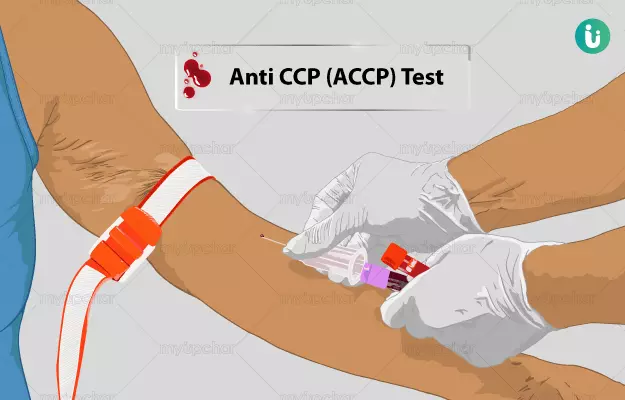Understanding The Importance Of The Anti-CCP Test
Introduction
In recent years, discussions surrounding the Anti-CCP (Anti-Cyclic Citrullinated Peptide) test have gained momentum in the medical community. This test plays a crucial role in the diagnosis and management of autoimmune diseases, particularly rheumatoid arthritis. In this article, we will delve into the depths of the Anti-CCP test, shedding light on what it is, why it matters, and how it is performed.
What is the Anti-CCP Test?
The Anti-CCP test, short for Anti-Cyclic Citrullinated Peptide test, is a diagnostic tool used primarily in the field of rheumatology. It is specifically designed to detect the presence of anti-cyclic citrullinated peptide antibodies in the blood.
Rheumatoid Arthritis: The Underlying Concern
Understanding Rheumatoid Arthritis
Before we dive into the intricacies of the Anti-CCP test, let’s grasp the basics of rheumatoid arthritis (RA). RA is an autoimmune disease that primarily affects the joints, causing inflammation, pain, and potential joint damage.
The Role of Autoantibodies in RA
To understand the Anti-CCP test fully, it’s essential to know how autoantibodies contribute to the development of RA. In RA, the body’s immune system mistakenly attacks healthy joint tissues, leading to inflammation. Autoantibodies play a pivotal role in this process.
The Significance of the Anti-CCP Test
High Specificity for RA
One of the key reasons the Anti-CCP test is highly regarded is its exceptional specificity for rheumatoid arthritis. It can help differentiate RA from other joint-related conditions, ensuring accurate diagnosis.
Early Detection
The Anti-CCP test is valuable for early detection. Identifying RA in its early stages can lead to more effective treatment and potentially better outcomes for patients.
How Does the Anti-CCP Test Work?
The Science Behind the Test
To understand how the test works, we’ll delve into the scientific principles involved, including citrullination and antibody detection.
Sample Collection and Analysis
Learn about the process of sample collection and laboratory analysis that goes into performing the Anti-CCP test.
Interpreting Anti-CCP Test Results
Positive vs. Negative Results
Discover what it means to receive a positive or negative result and how it impacts the diagnosis and treatment of RA.
Quantitative Results
Some labs provide quantitative results for the Anti-CCP test. Understand what these numbers signify and how they guide clinical decisions.
Clinical Applications
Learn how the Anti-CCP test contributes to the diagnostic criteria for rheumatoid arthritis and why it is considered a game-changer.
Monitoring Disease Progression
Explore how the test is used to monitor disease progression in RA patients, helping healthcare providers adjust treatment plans accordingly.
Anti-CCP Test: Advantages and Limitations
Advantages
Understand the advantages of the Anti-CCP test, such as its accuracy and ability to detect RA in its early stages.
Limitations
It’s important to acknowledge the limitations of the Anti-CCP test to use it effectively in a clinical setting. We’ll discuss these limitations in detail.
Conclusion
In conclusion, the Anti-CCP test is a vital tool in the diagnosis and management of rheumatoid arthritis. Its high specificity and ability to detect RA early make it an indispensable resource for both patients and healthcare providers. As research in this field continues to advance, we can anticipate further refinements and enhancements in the diagnostic process.
Frequently Asked Questions (FAQs)
Is the Anti-CCP test only used for rheumatoid arthritis diagnosis?
No, while it is primarily associated with RA, the Anti-CCP test can also be used to assist in the diagnosis of other autoimmune conditions.
How often should the Anti-CCP test be performed for RA patients?
The frequency of testing may vary depending on the patient’s condition and treatment plan. It is typically repeated periodically to monitor disease activity.
Are there any risks associated with the Anti-CCP test?
The test involves a simple blood draw and is generally considered safe. However, there may be minimal risks associated with any blood test, such as bruising or infection at the site of the blood draw.
Can a positive Anti-CCP test result confirm RA on its own?
A positive result is a strong indicator of RA, but it is typically considered alongside other clinical and laboratory findings to confirm the diagnosis.
Is there a cure for rheumatoid arthritis?
While there is no cure for RA, early diagnosis and treatment can help manage symptoms, slow the progression of the disease, and improve the quality of life for patients.
What is the Cost of Anti-CCP Test?
The cost of the Anti-CCP test in India can range from ₹1,500 to ₹3,500. However, prices may vary depending on the healthcare facility and location. It’s advisable to check with your local healthcare provider for specific pricing details.
By now, you should have a comprehensive understanding of the Anti-CCP test, its significance in diagnosing rheumatoid arthritis, and its broader implications in the field of autoimmune diseases. If you or someone you know is experiencing joint pain or other symptoms, it’s essential to consult with a healthcare professional for a thorough evaluation and appropriate testing.
